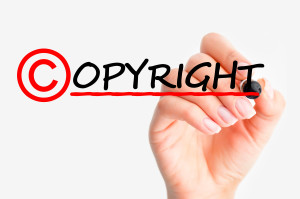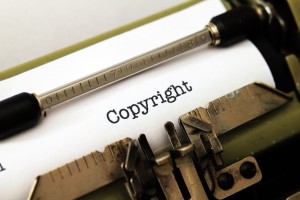Copyright basics for authors and writers
Several recent incidents have shown me that many authors, writers, and marketers don’t understand copyright law. I asked one of the best author attorneys I know, Sallie Randolph, to explain it here because understanding the law will protect you from legitimate demands for fees for using copyright protected text or images.
Sallie is a practicing attorney, freelance writer, and publishing consultant. She concentrates her law practice on the representation of authors, often consulting with or serving as co-counsel to other attorneys on publishing cases. A frequent speaker at programs for lawyers and writers, she has also taught law, writing, and journalism in a variety of educational settings, including several years at the University of Buffalo Law School, where she developed a copyright compliance program, instructed and supervised law student interns, taught courses in publishing law and legal ethics, and directed a publishing and copyright clinic. She has also taught media law for journalism majors at Buffalo State College and professional writing for numerous institutions. Learn more at AuthorLaw.com.
Copyright basics for authors and writers
Every author, writer, freelancer, and content creator needs to understand copyright. You need to understand and protect your own copyright rights, and, equally important, respect the copyrights of others.
What is copyright?
The word copyright means, literally, the right to copy. It is the legal expression of a fundamental property right that has since existed since the earliest civilizations, but only emerged as distinct legal right after invention of the printing press. Before printing, the rights in words and symbols were perceived as a single property right that arose as soon as they were carved in stone, painted on skins, written on papyrus or fixed in another tangible medium of expression.
Printing technology didn’t change the concept of written works as property, but it triggered awareness of an important distinction — the difference between the tangible object upon which written words were fixed and the intangible expression of a unique work created through the writer’s selection and arrangement of those words.
This distinction between physical property and intellectual property formed the basis of copyright law. Copyright was the first intellectual property right recognized in law as the technology revolution unraveled new strands in the ancient bundle of intellectual property rights.
Exclusive rights of the copyright owner (section 106 , title 17, U.S. Code) are:
- To reproduce the work.
- To prepare derivative works.
- To distribute copies or phonorecords of the work to the public by sale, rental, lease, or lending.
- In the case of literary, musical, dramatic, and choreographic works, pantomimes, and motion pictures and other audiovisual works, to perform the work publicly.
- In the case of literary, musical, dramatic, and choreographic works, pantomimes, and pictorial, graphic, or sculptural works, including the individual images of a motion picture or other audiovisual work, to display the copyrighted work publicly.
- In the case of sound recordings, to perform the copyrighted work publicly by means of a digital audio transmission.
The creator of copyrightable subject matter owns a copyright at the moment the work is “fixed in a tangible medium of expression.” But enforcement and protection of copyright rights takes effort:
- Registration: Registration of copyright is optional, but it provides important benefits and is a requirement to sue in federal court for copyright infringement.
- Monitoring: Many copyright owners regularly monitor social networking sites and the internet to see if their work is being infringed. Finding examples of infringement can be as simple as doing a Google search for a string of distinctive text to using sophisticated software capable of identifying specific photos and graphics.
- Enforcement Options: Those who find examples of infringement have a range of tools ranging from polite, diplomatic communications to strongly worded lawyer letters, to litigation – the filing of an actual lawsuit in federal court. An effective “do it yourself” option that victims of infringement may use is notice and takedown under the Digital Millennium Copyright Act (DMCA).
Respect copyright to avoid liability
Since the advent of the internet, there have been wild and misguided claims that copyright law is outdated and that “information wants to be free.” Such claims are simply not true.
These critics of copyright are really asking: “Now that it’s cheap and easy, isn’t it OK to steal words, music and art?” The answer is no. Copyright infringement is theft, pure and simple. Copyright law is clear and basic – words, pictures and sounds expressed in a distinctive way and written down or otherwise fixed in a tangible medium of expression are the property of the creator. “Thou shalt not steal,” is a core tenant recognized in virtually every civilized society and it applies to the rights of authors today.
Authors, in particular, should understand and respect copyright. Remember that rights in photos belong to the photographer, music to the composer, paintings to the artist. I am sometimes shocked at a few writers who just don’t “get it” and think that it’s OK to: download music from pirate sites or make up CD’s of their favorite music to give as gift; post photos they find on line on their own websites; or, use extensive quotations from other authors in their own work. Such assumptions are wrong.
Copyright is complicated, and copyright issues can come up in numerous, sometimes counter-intuitive and often convoluted ways. If you’re confused about copyright, keep the following points in mind:
- It’s not OK for someone to help themselves to your work, but it can sometimes be difficult to enforce your rights.
- It’s not OK to help yourself to someone else’s work, and you subject yourself to liability if you do.
- Permission makes it OK to use someone else’s work but attribution does not.
Get your copyright information from reliable sources. The copyright office, www.copyright.gov, is one of the best sources of accurate information. Consider your copyright education as a work in progress. There’s a lot to learn, so keep an open mind, don’t make assumptions, and don’t buy into copyright myths.
Some authors don’t care if others share their content with others because they believe the exposure is good for book sales or their career. How do you feel about that, even if that copying/pasting/sharing is a copyright violation? Please share your thoughts in a comment.
Like what you’re reading? Get it delivered to your inbox every week by subscribing to the free Build Book Buzz newsletter. You’ll also get my free “Top 5 Free Book Promotion Resources” cheat sheet immediately!




What about royalty free image sites that pretty much imply that you are free to use the images they display without any legal recourse? Many will look no further and feel that they have done their due diligence and are free to use such images, replicated in any manner they wish. But, even those sites have a terms and conditions (small print I might add) provision that you are on your own if there is a copyright owner who goes after you but of course, the website owner is absolved from all liability simply by stating this). This is highly misleading because most of the images on such sites do not identify who the copyright owner is. Sometime a photographer imprints his identity onto the image but no such identity is found on most of those images. This seems a catch 22 situation in that anyone who would like to feel 100% entitled to use any such image and cannot identify if there is a copyright owner or who it might be, might feel that it is safer not to use it (them) at all. Is there any such thing as 100% free to use, without any legal recourse, image site available? Also, how does one determine who owns a copyright for an image if there is no identifying evidence?
Good questions. You are right that many so called “royalty free” or clip art sites have onerous license restrictions or, worse, are scams. You must use all your normal consumer antennae when acquiring anything on the internet, including music, photos, or other content. It’s safest to assume that there is a copyright interest in almost everything on the internet and avoid using anything for which you can’t verify the ownership. You are also right that it’s difficult to find the owners of photos. Almost all photos are protected by copright, so if you can’t find the owner, don’t use the photo. I realize this is not a very satisfying answer.
Thanks for the article.
If someone has written a book and created a technique in the book, am I able to cite, explain, etc., that technique in my work?
There is an old myth going around about a “poor man’s patent” where you describe a process or invention in words and then register a copyright in the description. But that’s not true. You are perfectly free to write ABOUT other works as long as you don’t copy them exactly. Even then, copyright protection is such things as instructions, recipes, formulas , directories etc. is considered “thin.” So you are perfectly safe to write about processes you see described in articles.
Fine article by Sallie Randolph. I’ve always gotten written permission to use even one line of someone else’s work, and have never been asked to pay anything for its use. In addition to permission, I give full credit. But I do wonder if the copyright is more than 70 years old if it is in the public domain, and can be used. I note that Shakespeare and Greek philosophers are freely quoted, and assumed their works were public domain. How does this work?
All copyrights expire at the end of their term. After a copyright has expired the work enters into the public domain, meaning that it is no longer protected by copyright and is free for anyone to use. (“Public Domain” is not a well understood term and is frequently misused.) The terms of copyright have been extended a number of times over the years. The most recent, and longest, term of copyright is the life of the author PLUS 70 years. For that reason 70 years is not a reliable indicator of the expiration date of the copyright owned by a living person. Figuring out whether something is in the public domain is a tricky process. There is helpful and reliable information on the Copyright Office website, http://www.copyright.gov.
I decided to share this article on my Facebook timeline. I hope that is acceptable. Many of my “friends” are writers, editors and publishers, so I thought it important to get the word around.
Thanks.
Mark
It’s OK with me to share.
Deleted it just to be safe. I didn’t want to inadvertently commit any violation, even though countless article links are posted throughout Facebook every single day.
By the way, I am a professional freelance writer and seasoned editor, so I take this seriously.
Take care.
Mark, you can share a link to this post on your timeline, but you can’t copy and paste the entire article.
Sandy
Thank you, Sandra. The fact that others do this should tip one off. As a writer and editor of former publications, I knew about the links a while ago. I guess I was feeling a bit paranoid yesterday. Sorry.
Mark
I completely understand, Mark! You are smart to err on the “safe” side! Thanks for commenting. I appreciate it.
Sandy
Thanks for that defining advice Sandra. On reading through all of this information I was beginning to get a bit paranoid that I may have done something wrong after all. Yesterday I posted a couple of links on my blog and was beginning to wonder if I had breached copyright. I am always very mindful of doing the right thing, so pleased to read that a link is ok. Feeling relieved, Sandra
You’re safe, Sandra!
: )
Sandy
I have a novel in the works that uses song titles as chapter titles. I’ve been told lyrics hold copyrights for the songwriter, but titles cannot be copyrighted and are okay to use. Is that correct?
It’s true that you can’t get a copyright in a short title, but there are potential trademark issues to consider with titles. In this case, it’s probably OK to write ABOUT songs, referring to them by title, as opposed to quoting the lyrics directly.
Countries has different copyright law? Isn’t copyright law unique globally?
It’s true that different countries have different copyright laws, but there are several international treaties under which signatories give copyright protection to the other signatories’ citizens. The United States is a signatory to the major treaties and has bilateral treaties with a number of individual countries. This means that US authors have broad world-wide copyright protection.
Thanks for your reply. Unfortunately i am not from united states.
Chances are that your country is a signatory to one or more international copyright treaties. If it is, then other signatory nations will protect your work under the same standards that your country’s copyright law does. This is a broad generalization, but what it boils down to is:
1. Be sure to respect the copyrights of others, and
2. If you find that others are stealing your work, contact your government representatives, author societies, artist networks etc. to see what you can learn about how to enforce your rights. You could also try to find an intellectual property lawyer in your country, but
3. Be aware that just as professional writers expect to be paid for their work, lawyers are also entitled to compensation for making use of their special skills.It’s true that many writers choose to give their work away for a variety of reasons, and many lawyers do pro bono work, but don’t expect either authors or lawyers to work for free. The choice is theirs, not yours.
Hi,
We are brand promotion agency in India. Copyright is most important factor for protect the brands. It’s not only writer problem!
Of course that’s true — no argument here. But since this blog is for authors, we’ve approached the subject with them in mind. Thanks for commenting!
Sandy